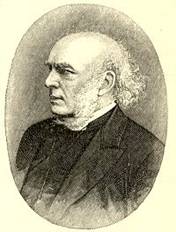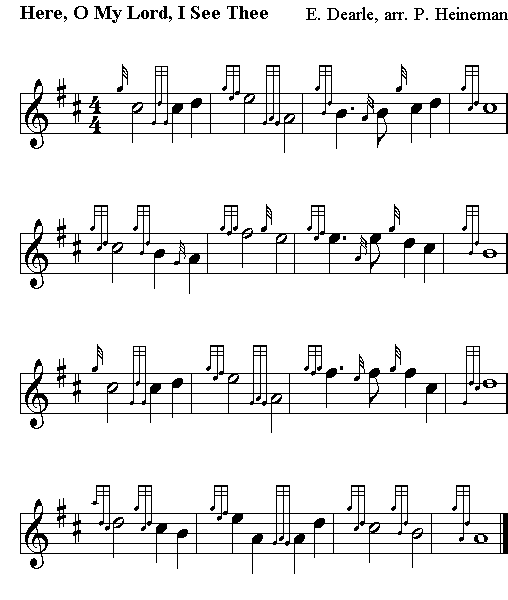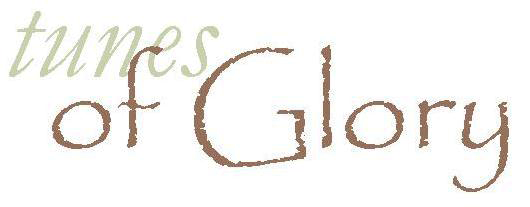
Best viewed in
Internet Explorer
Music (PDF)
Midi
Music (BMW)
Back to

Updated
09/04/2020 |
Here, Oh My
Lord, I See Thee
|
The lyrics to "Here, Oh My Lord, I
See The" were penned by Horatius Bonar
(1808-1889) born in Edinburgh, Scotland.
The son of James Bonar, Solicitor of
Exise for Scotland, he was educated in Edinburgh. He comes from
a long line of ministers who have served a total of 364 years in
the Church of Scotland. One of eleven children, his brothers
John James and Andrew Alexander were also ministers of the Free
Church of Scotland. He had married Jane Catherine Lundie in 1843
and five of their young children died in succession. Towards the
end of their lives, one of their surviving daughters was left a
widow with five small children and she returned to live with her
parents.
In 1853 Bonar earned the Doctor of Divinity degree at the
University of Aberdeen. He entered the Ministry of the Church
of Scotland. At first he was put in charge of mission work at
St. John's parish in Leith and settled at Kelso. He joined the
Free Church at the time of the Disruption of 1843, and in 1867
was moved to Edinburgh to take over the Chalmers Memorial Church
(named after his teacher at college, Dr. Thomas Chalmers). In
1883, he was elected Moderator of the General Assembly of the
Church of Scotland.
Bonar has been called “the prince of Scottish hymn writers.”
After graduating from the University of Edinburgh, he
was ordained in 1838, and became pastor of the North Parish,
Kelso. He joined the Free Church of Scotland after the
“Disruption” of 1843, and for a while edited the church’s
The Border Watch. Bonar remained in
Kelso for 28 years, after which he moved to the Chalmers
Memorial church in Edinburgh, where he served the rest of
his life. |

Horatius Bonar |
Bonar wrote more than 600 hymns. At a
memorial service following his death, his friend, Rev. E. H. Lundie,
said:
"His hymns were written in very varied
circumstances, sometimes timed by the tinkling brook that babbled
near him; sometimes attuned to the ordered tramp of the ocean, whose
crested waves broke on the beach by which he wandered; sometimes set
to the rude music of the railway train that hurried him to the scene
of duty; sometimes measured by the silent rhythm of the midnight
stars that shone above him."
The lyrics
are set to the tune, Penitentia, by Edward Dearle (1806-1891).
Dearle was a chorister at King’s College, Trinity, and St. John’s
College, Cambridge. He attended Cambridge (MusD 1842), served as
organist at St. Paul’s, Deptford, and Newark-upon-Trent (1835-64),
and wrote a large body of religious music.

Lyrics by Horatius Bonar
|
|
Here, O my Lord, I see
Thee face to face;
Here would I touch and handle things unseen;
Here grasp with firmer hand eternal grace,
And all my weariness upon Thee lean.
This is the hour of
banquet and of song;
This is the heavenly table spread for me;
Here let me feast, and feasting, still prolong
The hallowed hour of fellowship with Thee.
Here would I feed
upon the bread of God,
Here drink with Thee the royal wine of Heaven;
Here would I lay aside each earthly load,
Here taste afresh the calm of sin forgiven.
I
have no help but Thine; nor do I need
Another arm save Thine to lean upon;
It is enough, my Lord, enough indeed;
My strength is in Thy might, Thy might alone. |
I have no wisdom save in
Him Who is
My Wisdom and my Teacher both in One;
No wisdom can I lack while Thou art wise;
No teaching do I crave save Thine alone.
Mine is the sin, but
Thine the righteousness:
Mine is the guilt, but Thine the cleansing blood;
Here is my robe, my refuge, and my peace;
Thy Blood, Thy righteousness, O Lord my God!
Too soon we rise; the
symbols disappear;
The feast, though not the love, is past and gone.
The bread and wine remove; but Thou art here,
Nearer than ever, still my Shield and Sun.
Feast
after feast thus comes and passes by;
Yet, passing, points to the glad feast above,
Giving sweet foretaste of the festal joy,
The Lamb’s great bridal feast of bliss and love. |
|



